
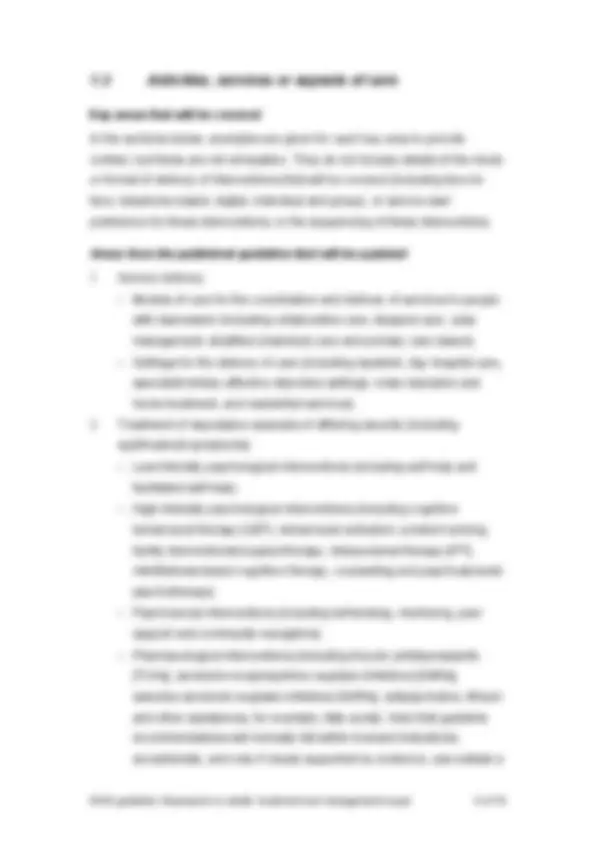
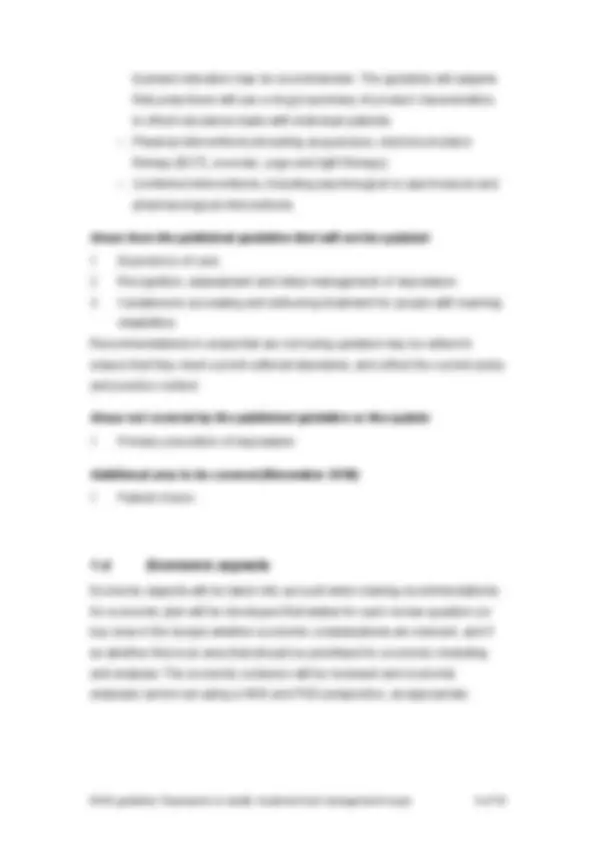
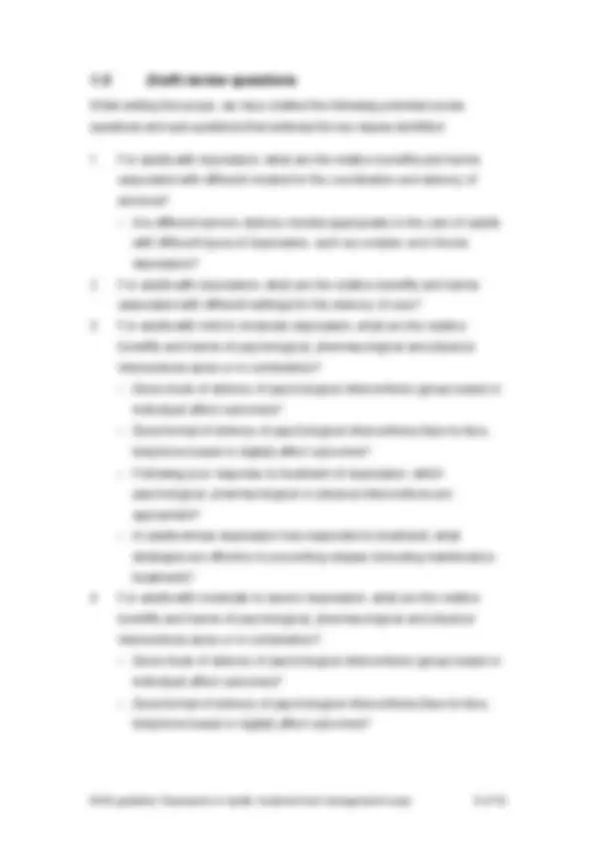
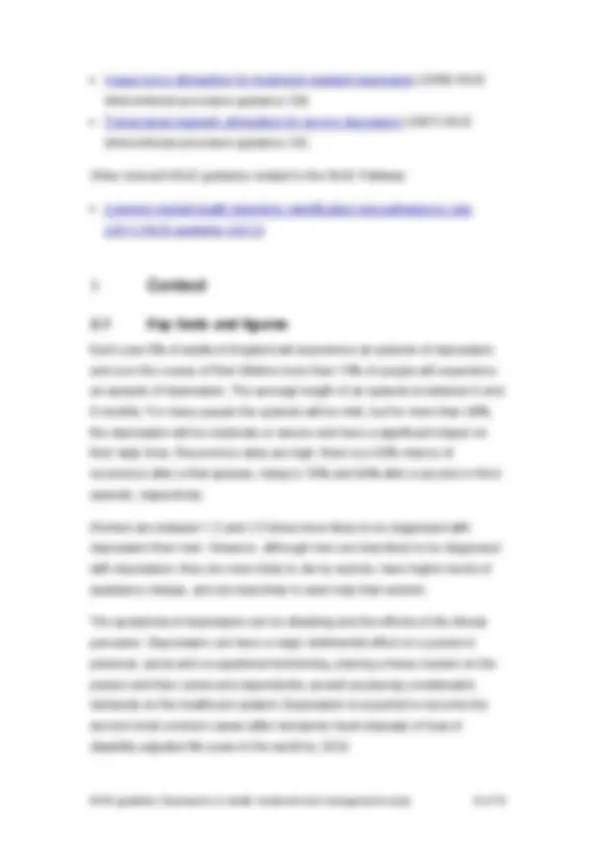
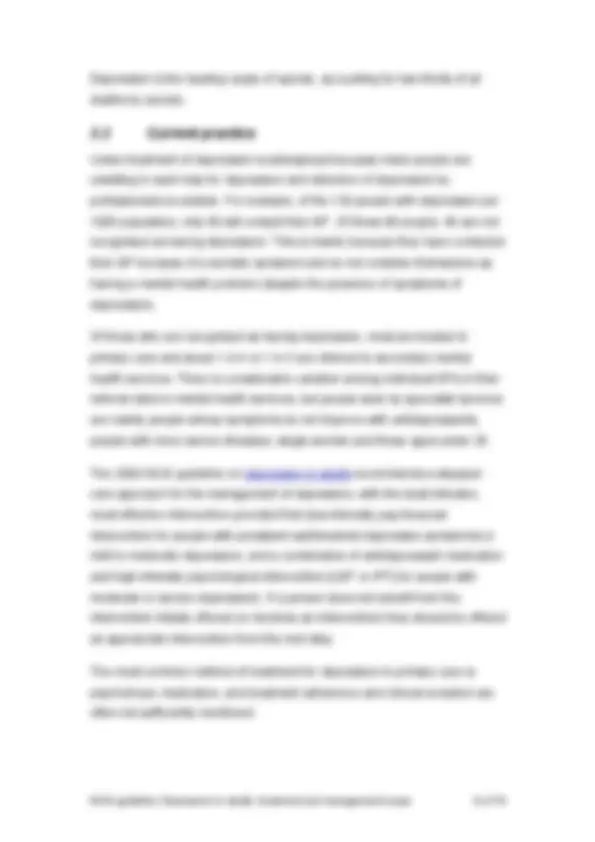
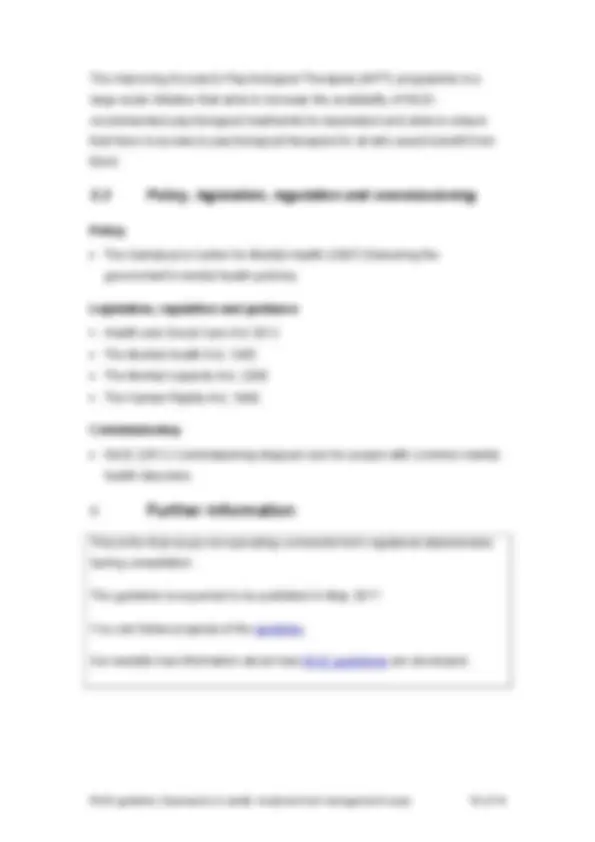


Study with the several resources on Docsity

Earn points by helping other students or get them with a premium plan


Prepare for your exams
Study with the several resources on Docsity

Earn points to download
Earn points by helping other students or get them with a premium plan
Community
Ask the community for help and clear up your study doubts
Discover the best universities in your country according to Docsity users
Free resources
Download our free guides on studying techniques, anxiety management strategies, and thesis advice from Docsity tutors
An overview of the National Institute for Health and Care Excellence (NICE) guideline on depression in adults, including its scope, key areas of coverage, draft review questions, and related NICE guidance. The guideline aims to update the existing NICE guideline on depression in adults and will cover the coordination and delivery of services, recognition, assessment, and initial management of depression, as well as cost effectiveness and resource use.
Typology: Lecture notes
1 / 10

This page cannot be seen from the preview
Don't miss anything!







This guideline will update the NICE guideline on depression in adults (CG90) as set out in the update decision.
Who should take action:
professionals involved in the treatment and care of people with depression in primary care, secondary care and specialist mental health care professionals in other health, social care and non-health sectors who may have direct contact with, or are involved in, the provision of health and other public services for those with depression. This may include professionals who work in the criminal justice sector those with responsibility for planning services for people with depression and their carers, including directors of public health, NHS trust managers and managers in clinical commissioning groups.
It will also be relevant for:
people with depression (depressive disorder and persistent subthreshold depressive symptoms) and their families/carers the public.
NICE guidelines cover health and care in England. Decisions on how they apply in other UK countries are made by ministers in the Welsh Government, Scottish Government, and Northern Ireland Executive.
NICE has carried out an equality impact assessment during scoping. The assessment:
lists equality issues identified, and how they have been addressed explains why any groups are excluded from the scope, if this was done.
1 What the guideline is about
Groups that will be covered
Adults (aged 18 years and older) with mild, moderate or severe depression, including people with chronic depression. People with persistent subthreshold symptoms will also be included. Specific consideration will be given to: men older people people from black and minority ethnic groups people with coexisting mental health conditions.
Settings that will be covered
The guideline will cover the care and shared care provided or commissioned by health (primary, secondary and tertiary) and social care services. This guideline will also be relevant to other community and social care settings (including criminal justice settings), although they are not explicitly covered.
licensed indication may be recommended. The guideline will assume that prescribers will use a drug’s summary of product characteristics to inform decisions made with individual patients. Physical interventions (including acupuncture, electroconvulsive therapy [ECT], exercise, yoga and light therapy). Combined interventions, including psychological or psychosocial and pharmacological interventions.
Areas from the published guideline that will not be updated
1 Experience of care. 2 Recognition, assessment and initial management of depression. 3 Variations to accessing and delivering treatment for people with learning disabilities. Recommendations in areas that are not being updated may be edited to ensure that they meet current editorial standards, and reflect the current policy and practice context.
Areas not covered by the published guideline or the update
1 Primary prevention of depression.
Additional area to be covered (November 2018)
1 Patient choice
Economic aspects will be taken into account when making recommendations. An economic plan will be developed that states for each review question (or key area in the scope) whether economic considerations are relevant, and if so whether this is an area that should be prioritised for economic modelling and analysis. The economic evidence will be reviewed and economic analyses carried out using a NHS and PSS perspective, as appropriate.
While writing this scope, we have drafted the following potential review questions and sub-questions that address the key issues identified:
1 For adults with depression, what are the relative benefits and harms associated with different models for the coordination and delivery of services? Are different service delivery models appropriate to the care of adults with different types of depression, such as complex and chronic depression? 2 For adults with depression, what are the relative benefits and harms associated with different settings for the delivery of care? 3 For adults with mild to moderate depression, what are the relative benefits and harms of psychological, pharmacological and physical interventions alone or in combination? Does mode of delivery of psychological interventions (group-based or individual) affect outcomes? Does format of delivery of psychological interventions (face-to-face, telephone-based or digital) affect outcomes? Following poor response to treatment of depression, which psychological, pharmacological or physical interventions are appropriate? In adults whose depression has responded to treatment, what strategies are effective in preventing relapse (including maintenance treatment)? 4 For adults with moderate to severe depression, what are the relative benefits and harms of psychological, pharmacological and physical interventions alone or in combination? Does mode of delivery of psychological interventions (group-based or individual) affect outcomes? Does format of delivery of psychological interventions (face-to-face, telephone-based or digital) affect outcomes?
11 Cost effectiveness. 12 Resource use.
2 Links with other NICE guidance
NICE guidance about the experience of people using NHS services
Patient experience in adult NHS services (2012) NICE guideline CG Service user experience in adult mental health (2011) NICE guideline CG Medicines adherence (2009) NICE guideline CG
NICE guidance in development that is closely related to this guideline
NICE is currently developing the following guidance that is closely related to this guideline:
Major depressive disorder – vortioxetine. NICE technology appraisal. Publication expected September 2015. Transcutaneous cranial electrical stimulation for insomnia, depression or anxiety. NICE interventional procedure guidance. Publication date to be confirmed.
When this guideline is published, the recommendations will update the adults section of the current NICE pathway on depression. NICE Pathways bring together all related NICE guidance and associated products on a topic in an interactive topic-based flow chart.
Other relevant NICE guidance included in the NICE Pathway:
Depression in adults with a chronic physical health problem (2009) NICE guideline CG Depression in children and young people (2015) NICE guideline CG Agomelatine for the treatment of major depressive episodes (terminated appraisal) (2011) NICE technology appraisal 231
Vagus nerve stimulation for treatment-resistant depression (2009) NICE interventional procedure guidance 330 Transcranial magnetic stimulation for severe depression (2007) NICE interventional procedure guidance 242.
Other relevant NICE guidance related to the NICE Pathway:
Common mental health disorders: Identification and pathways to care (2011) NICE guideline CG
3 Context
Each year 6% of adults in England will experience an episode of depression, and over the course of their lifetime more than 15% of people will experience an episode of depression. The average length of an episode is between 6 and 8 months. For many people the episode will be mild, but for more than 30%, the depression will be moderate or severe and have a significant impact on their daily lives. Recurrence rates are high: there is a 50% chance of recurrence after a first episode, rising to 70% and 90% after a second or third episode, respectively.
Women are between 1.5 and 2.5 times more likely to be diagnosed with depression than men. However, although men are less likely to be diagnosed with depression, they are more likely to die by suicide, have higher levels of substance misuse, and are less likely to seek help than women.
The symptoms of depression can be disabling and the effects of the illness pervasive. Depression can have a major detrimental effect on a person’s personal, social and occupational functioning, placing a heavy burden on the person and their carers and dependents, as well as placing considerable demands on the healthcare system. Depression is expected to become the second most common cause (after ischaemic heart disease) of loss of disability-adjusted life years in the world by 2020.
The Improving Access to Psychological Therapies (IAPT) programme is a large-scale initiative that aims to increase the availability of NICE- recommended psychological treatments for depression and aims to ensure that there is access to psychological therapies for all who would benefit from them.
Policy
The Sainsbury's Centre for Mental Health (2007) Delivering the government's mental health policies.
Legislation, regulation and guidance
Health and Social Care Act 2012 The Mental Health Act, 1983 The Mental Capacity Act, 2005 The Human Rights Act, 1998.
Commissioning
NICE (2011) Commissioning stepped care for people with common mental health disorders.
4 Further information
This is the final scope incorporating comments from registered stakeholders during consultation.
The guideline is expected to be published in May 2017.
You can follow progress of the guideline.
Our website has information about how NICE guidelines are developed.